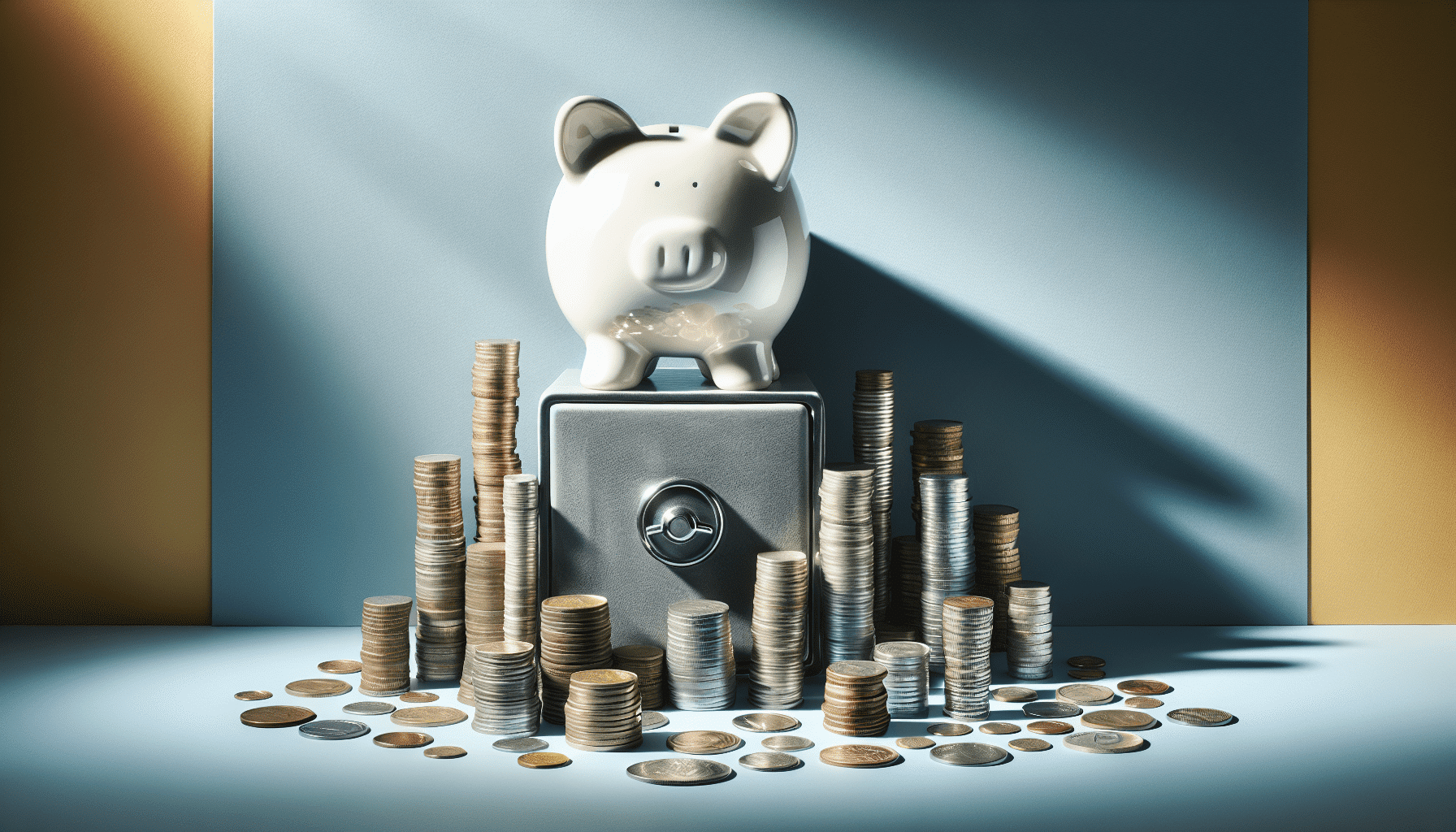Are you tired of struggling to save money each month? Look no further! In this article, we will explore a range of budget-friendly techniques that will help you maximize your savings without sacrificing your quality of life. From clever tips on reducing your monthly expenses to effective strategies for increasing your income, we've got you covered. Get ready to embark on a journey towards financial freedom and start seeing those savings grow!
Create a Budget
Creating a budget is the first step towards maximizing your monthly savings. By carefully tracking your income and expenses, you can gain a clear understanding of where your money is going and identify areas where you can cut back. Start by listing all of your sources of income and then track your expenses over a set period, such as a month. This will allow you to see where your money is being spent and make adjustments as needed.
Track Your Income and Expenses
To effectively create a budget, it's important to track both your income and expenses. Make a detailed list of all the money coming in, including your salary, bonuses, side hustles, and any other sources of income. On the expense side, include all of your regular monthly bills such as rent or mortgage payments, utilities, groceries, transportation, and entertainment. By tracking your income and expenses, you can see if there is a gap between what you are earning and what you are spending, allowing you to make necessary adjustments.
Set Financial Goals
Once you have a clear understanding of your income and expenses, it's time to set financial goals. Whether you want to pay off debt, save for a down payment on a house, or build an emergency fund, setting specific goals will provide you with a roadmap for your financial journey. Start by prioritizing your goals and breaking them down into smaller, achievable milestones. This will help you stay motivated and focused on your financial objectives.
Allocate Funds for Savings
To maximize your monthly savings, it's crucial to allocate a portion of your income towards savings. Aim to save at least 20% of your income, but if that is not feasible, start with a smaller percentage and gradually increase it over time. Set up automatic transfers from your checking account to a separate savings account to make saving easier and more convenient. By making savings a priority, you will be better prepared for unexpected expenses and future financial goals.
Reduce Utility Costs
Cutting down on utility costs is another effective way to increase your monthly savings. Small changes in your energy and water usage can add up to significant savings over time. Start by turning off unnecessary lights and appliances when they are not in use. Using energy-efficient light bulbs can also help reduce your electricity bill. Lowering the thermostat by a few degrees in the winter and using less air conditioning in the summer can also lead to savings. Finally, monitor your water usage by fixing leaks and being mindful of how long you take showers or run the faucet.
Turn Off Unnecessary Lights and Appliances
Every light bulb left on or appliance left plugged in adds to your energy bill. Make it a habit to turn off lights when you leave a room or when they're not needed. Unplug devices, such as chargers and kitchen appliances, that are not in use to prevent them from drawing power. By being mindful of energy usage, you can significantly reduce your utility costs.
Use Energy-Efficient Light Bulbs
Replacing traditional incandescent light bulbs with energy-efficient alternatives, such as LED or CFL bulbs, can help lower your electricity bill. Energy-efficient bulbs use less energy and last longer, saving you money in the long run. Although they may cost more upfront, their longer lifespan and lower energy consumption make them a wise investment.
Lower the Thermostat
During the colder months, lowering your thermostat by just a few degrees can make a noticeable difference in your heating bill. By bundling up with extra layers or using blankets, you can stay warm while saving money. In the summer, try using fans instead of air conditioning or set the temperature a few degrees higher to reduce energy usage.
Monitor Water Usage
Be conscious of your water consumption to save on your monthly utility bill. Fix any leaky faucets promptly and consider installing low-flow showerheads and faucets. Additionally, try to take shorter showers and turn off the faucet when you're not actively using it, such as while brushing your teeth or washing the dishes. These small changes can help reduce your water bill and conserve resources.
Save on Groceries
Groceries are a significant expense for most households, but there are several budget-friendly techniques you can implement to save money in this area. Planning meals and making a shopping list before heading to the store can help you stick to a budget and avoid impulse buys. Additionally, consider buying generic brands instead of name brands. They often cost less but are of similar quality. Utilize coupons and take advantage of sales to further reduce your grocery expenses. Lastly, be mindful of impulse buys and try to shop when you're not hungry to avoid unnecessary purchases. If possible, buying in bulk can also save you money in the long run.
Plan Meals and Make a Shopping List
Planning your meals in advance can save you time and money. By creating a weekly meal plan and making a shopping list, you can avoid last-minute trips to the store and impulse purchases. Plan meals based on ingredients you already have and look for recipes that utilize items on sale or in-season produce. Stick to your list when you go grocery shopping to avoid unnecessary purchases and stay within your budget.
Buy Generic Brands
Consider purchasing generic or store brands instead of more expensive name brands. Generic products often have similar quality but come at a lower price. Compare the ingredients and nutritional value to ensure you're making a smart choice. By opting for generic brands, you can save money without compromising on quality.
Use Coupons and Shop Sales
Make it a habit to look for coupons and sales before heading to the grocery store. Many grocery stores offer digital or paper coupons that can help you save money on your purchases. Check your local newspaper or online coupon websites for additional savings opportunities. Plan your shopping around sales to take advantage of discounted prices on items you regularly use. By being proactive and strategic with your shopping, you can maximize your savings on groceries.
Avoid Impulse Buys
Impulse buys can quickly derail your budget and inflate your grocery bill. To avoid unnecessary purchases, shop with a plan and stick to your shopping list. Avoid shopping when you're hungry, as it can lead to impulse buying. If you come across an item you hadn't planned to purchase, give yourself some time to think it over before making the decision. Taking a moment to consider the purchase can help you determine if it's a true necessity or just an impulse.
Buy in Bulk
For items that you use frequently and have a long shelf life, consider buying in bulk to save money. Warehouse stores or bulk retailers often offer lower prices on items such as non-perishable food, cleaning supplies, and personal care products. However, be mindful of your storage space and the expiration dates of the items you're purchasing. Only buy in bulk if you can consume or use the products before they expire.
Minimize Eating Out
Eating out can be a significant drain on your budget, but there are several strategies you can employ to minimize this expense. Cooking at home is one of the most effective ways to save money on food. Plan your meals and prepare them in advance, so you're less tempted to dine out. Taking a packed lunch to work instead of buying lunch can also lead to significant savings over time. Limiting restaurant visits to special occasions or using them as a treat can help you enjoy dining out while keeping your budget intact.
Cook at Home
Cooking at home is not only a healthier option but also a more budget-friendly one. By preparing meals yourself, you have control over the ingredients and portion sizes, which can help save money. Invest in cookbooks or explore online recipes for inspiration. Cooking at home can also be a fun activity for you and your family or friends.
Take a Packed Lunch to Work
Packing your lunch for work is a simple yet effective way to save money. While it may take a little extra time and effort, the savings can be substantial. Plan your lunches in advance and prepare them the night before to save time in the morning. Packing your lunch gives you more control over the quality and cost of your meals, and it eliminates the temptation to eat out.
Limit Restaurant Visits
While dining out can be enjoyable, it's important to limit restaurant visits to special occasions. Eating at restaurants regularly can quickly add up, impacting your budget. Reserve dining out for birthdays, anniversaries, or other significant events. By treating restaurant visits as a special treat, you can enjoy the experience without breaking the bank.
Cut Cable and Subscription Costs
Cutting down on cable and subscription costs is another effective way to reduce expenses and increase your monthly savings. Evaluate your current subscriptions and cancel any that are not essential or no longer bring value to your life. Consider switching from cable to streaming services, as they often offer more affordable options with a wide range of content. Finally, negotiating with your cable provider for a lower monthly bill can lead to significant savings over time.
Cancel Unused Subscriptions
Take a closer look at your monthly subscriptions and consider canceling any that you no longer use or need. This includes streaming services, gym memberships, magazine subscriptions, and more. By eliminating unused subscriptions, you can free up extra money each month that can be put towards savings or other financial goals.
Switch to Streaming Services
Streaming services have become increasingly popular and offer a more cost-effective alternative to traditional cable. Many streaming platforms provide a wide range of content, including movies, TV shows, and original programming. Evaluate your television-watching habits and consider switching to streaming services that align with your needs and budget. With plenty of options available, you can tailor your subscription choices to fit your preferences and save money.
Negotiate Lower Cable Bills
If you prefer to stick with cable or have internet bundled with your cable service, consider negotiating for lower monthly rates. Research competitive pricing in your area and use this information as leverage when speaking to your cable provider. They may be willing to offer you a lower rate or provide additional services to keep your business. Remember, it never hurts to ask, and you may be surprised by the savings you can achieve just by negotiating.
Slash Transportation Expenses
Transportation costs can eat up a significant portion of your monthly budget, but there are several steps you can take to reduce these expenses. Consider using public transportation instead of driving when possible. This not only saves money on gas but also reduces wear and tear on your car. If you have coworkers who live nearby, consider carpooling or sharing rides to split the cost of commuting. Whenever feasible, opt to walk or bike for short distances rather than using your car. Combining errands into a single trip can also help you save on gas and time.

Use Public Transportation
Using public transportation is an excellent way to save money on transportation expenses. Buses, trains, and subways typically cost significantly less than driving a car, especially when considering factors such as gas, parking fees, and vehicle maintenance. Additionally, public transportation can reduce the stress of driving in heavy traffic or finding parking. Explore the public transportation options available in your area and consider incorporating them into your daily commute.
Carpool or Share Rides
If public transportation is not an ideal option for your situation, consider carpooling or sharing rides with coworkers, friends, or neighbors. By splitting the cost of commuting, you can save money on gas and reduce the wear and tear on your vehicle. Coordinate schedules with others in your area to maximize the benefits of carpooling or ride-sharing.
Walk or Bike Short Distances
For short distances, consider walking or biking instead of driving. Not only does this save money on transportation costs, but it also offers health benefits and helps reduce your carbon footprint. Walking or biking can be an enjoyable and environmentally friendly way to travel, especially for distances within a few miles of your home or workplace.
Combine Errands
Reducing the number of trips you take by combining errands can save you time, money, and energy. Instead of making multiple trips throughout the week, plan your errands in a way that allows you to complete them in a single outing. This helps minimize the number of miles driven and reduces the amount of gas used. By strategically planning your errands, you can maximize efficiency and save money.
Avoid Impulse Buying
Impulse buying can quickly derail your budget and hinder your efforts to maximize savings. Implementing strategies to avoid impulsive purchases is key to maintaining financial discipline. One effective technique is to create a waiting period. If you see something you want to buy, give yourself a set amount of time before making the purchase. This allows you to evaluate if the item is truly necessary or if it's simply a fleeting desire.
Create a Waiting Period
To curb impulse buying, create a waiting period before making any non-essential purchases. Instead of immediately buying something, give yourself a set amount of time, such as 24 hours or a week, to think it over. During this waiting period, consider if the purchase aligns with your financial goals and if it's something you truly need or want. Often, you'll find that the initial desire to buy fades over time, saving you money and preventing regrettable purchases.

Practice Mindful Spending
Mindful spending involves being intentional and aware of your purchases. Before making a purchase, ask yourself if the item is aligned with your values and if it brings long-term value to your life. Consider the financial impact of the purchase and if the money could be better used elsewhere, such as saving or paying off debt. By adopting a mindful spending mindset, you can avoid impulse buying and make more informed financial decisions.
Avoid Shopping When Emotionally Vulnerable
Shopping can be a way to cope with emotions or seek temporary happiness. However, making purchases when you're emotionally vulnerable can lead to regrettable decisions and wasted money. Be mindful of your emotional state when shopping and avoid making purchases as a means of emotional comfort. Instead, find healthier ways to manage your emotions or seek support from friends, family, or professionals.
Find Ways to Earn Extra Income
Increasing your income is a powerful way to boost savings and achieve your financial goals faster. Consider exploring opportunities to earn extra income outside of your primary job. Part-time jobs, freelancing, and consulting work can provide additional sources of income. Additionally, if you have a spare room or parking space, consider renting it out for extra cash. Evaluate your skills and interests to find suitable options that align with your schedule and financial objectives.
Part-Time Job
Taking on a part-time job can provide a steady stream of additional income. Look for opportunities in your local community or online job boards. Part-time jobs can range from retail or hospitality positions to freelance work in your area of expertise. Consider your skills, availability, and preferred work environment when searching for part-time employment.
Freelancing or Consulting
If you have marketable skills or specialized knowledge, consider freelancing or consulting in your field. Many companies and individuals are willing to pay for expertise on a per-project basis. This allows you to work flexibly and earn extra income while utilizing your skills and experience. Websites and platforms dedicated to freelancing or consulting can help connect you with potential clients and opportunities.
Rent Out a Spare Room or Parking Space
If you have a spare room in your home or unused parking space, consider renting it out for extra income. Platforms such as Airbnb or local rental websites allow you to advertise your space to potential guests. Renting out a spare room can provide a steady income stream, especially if you live in a desirable location. Similarly, renting out a parking space can be lucrative if you live in an area with limited parking availability.
Save on Housing Costs
Housing costs typically represent a significant portion of a person's monthly budget. By implementing strategies to reduce these expenses, you can save a substantial amount of money. Evaluate your housing options and consider downsizing or finding roommates to share expenses. Negotiating your rent can also lead to savings. Finally, reducing energy usage can result in lower utility bills, further contributing to your overall housing cost savings.
Evaluate Housing Options
Regularly evaluating your housing options can help you identify opportunities for cost savings. Consider if downsizing to a smaller home or apartment is feasible for your lifestyle. Moving to a less expensive neighborhood or city can also significantly reduce housing costs. When evaluating housing options, weigh factors such as rent or mortgage payments, commuting costs, and proximity to amenities.
Consider Downsizing or Roommates
If your current living situation is more than you need or can afford, consider downsizing your home or apartment. Downsizing can help reduce rental or mortgage costs, as well as the cost of utilities and maintenance. Additionally, finding roommates to share living expenses can significantly reduce housing costs. Whether it's renting out a spare room or splitting costs with others, sharing housing expenses can make a substantial difference in your budget.
Negotiate Rent
If you're renting your home, consider negotiating your rent or lease terms to save money. Before initiating negotiations, research rental prices in your area to determine the market value of your home. Present this information to your landlord and express your desire to continue living there but at a lower cost. They may be open to lowering the rent or offering other incentives to retain you as a tenant. Negotiating your rent can result in substantial savings over the course of your lease.
Reduce Energy Usage
Reducing your energy usage not only benefits the environment but also helps you save on utility costs. Implement energy-saving measures such as installing energy-efficient light bulbs, insulating your home, and using a programmable thermostat. Unplug electronics and appliances when not in use, and take advantage of natural lighting and ventilation to reduce the need for artificial lighting and air conditioning. By being mindful of your energy consumption, you can lower your utility bills and save money.
Automate Savings
Automating your savings is a simple yet effective way to ensure you consistently save money each month. Set up automatic transfers from your checking account to a separate savings account on payday. By doing this, you prioritize saving before spending, making it easier to meet your financial goals. Additionally, consider utilizing round-up apps that automatically save the spare change from your purchases. These small amounts can quickly add up over time, contributing to your overall savings.
Set Up Automatic Transfers
Setting up automatic transfers from your checking account to a separate savings account can help you save consistently. Determine the amount you want to save each month and schedule transfers to occur on payday. By automating your savings, you remove the temptation to spend the money and ensure that you are consistently building your savings.
Save Before Spending
Aim to save a portion of your income before allocating funds for spending. Treat savings as a non-negotiable expense and prioritize it in your budget. By adopting this mindset, you ensure that saving is a top priority and maximize the amount you save each month. Regardless of your income level, saving before spending helps you build a strong financial foundation.
Utilize Round-Up Apps
Round-up apps are a convenient way to automate savings without much effort. These apps track your purchases and round up the total to the nearest dollar. The difference is then transferred to a separate savings account. Over time, these small amounts accumulate into significant savings. Many banks and financial institutions offer round-up apps, so explore your options and find one that fits your needs.




